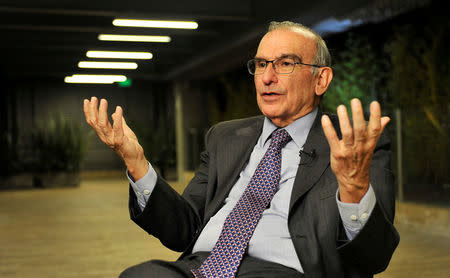Colombia's De La Calle seeks to protect peace deal if wins presidency
By Luis Jaime Acosta
BOGOTA (Reuters) - After four years negotiating a peace accord that ended a five-decade conflict with Marxist FARC rebels, presidential candidate Humberto De La Calle said late on Wednesday he will ensure the Andean nation does not return to the nightmare of war if he wins office.
Center-left De La Calle, a 71-year-old lawyer and former vice president, represented the government as chief negotiator in talks with the Revolutionary Armed Forces of Colombia (FARC). His efforts helped bring an end to the FARC's part in a conflict that has killed more than 220,000 people and displaced millions.
But after the signing the agreement in late 2016, De La Calle says peace could be threatened by problems in implementing the accord and by promises by right-wing candidate Ivan Duque to make changes to the agreement.
"I am committed to peace in Colombia, I ended the conflict and now it's time for peace, a firm peace," De La Calle told Reuters, warning that it would be a "perverse" error to change agreements.
"A government that does not fulfill its word commits an act of perfidy, it's enormously serious," said the Liberal Party candidate.
He also participated in failed talks with the FARC back in 1991.
While De La Calle is trailing fourth behind rival candidates, with Duque in the lead, he hopes to pull out a surprise win to defend the peace agreement and promote the economic and social reforms the country needs to reduce poverty and inequality.
De La Calle, who favours reducing taxes on businesses to increase productivity, said he would review tax breaks and fight tax evasion to try to bring a further $2 billion annually into the economy.
De La Calle also recognised the need to improve education and health for the poorest of Colombia's population of 50 million.
"This is one of the most unequal societies ... something that does not match the capacity of the economy," said the father of three.
He said he would maintain good relations with the United States but not allow ties to be based mainly on the issue of drug trafficking. He also said he would seek to avoid any confrontation with Venezuela's "dictator," President Nicolas Maduro.
In the event De La Calle does not meet the more than 50 percent threshold in May to go through to the second round of voting in June, his party could be decisive in tipping the balance in favour of one or other of the candidates.
(Reporting by Helen Murphy)

 Yahoo News
Yahoo News 

